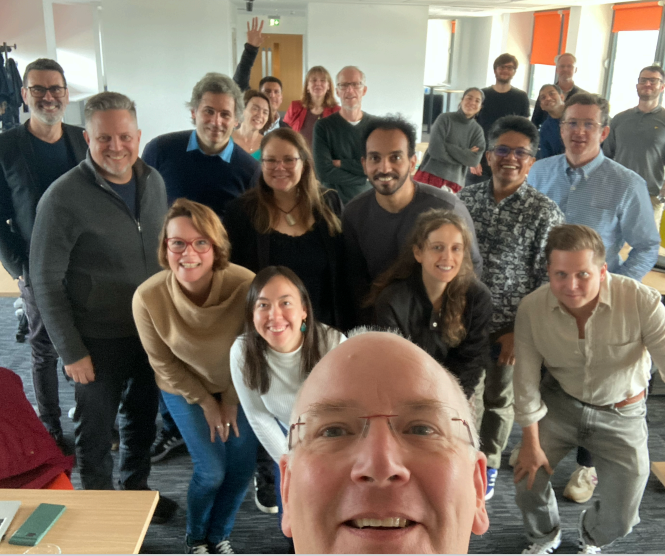
Exploring Disruptions in Green Energy Transitions
Featured image copyright: gettyimages
Sandra Barragán and Matthew Paterson discuss the outcomes of a workshop on key disruptions and future research pathways in green energy transitions.

From September 11th to 13th, the SCI hosted a dynamic workshop on ‘Green energy transitions and global disruption’ in the context of our current project with the same name. Beyond developing collective insights on energy transition challenges, the workshop aimed to explore new, effective methods for connecting diverse perspectives on these issues.
A team based at Manchester, with colleagues in the SCI, Politics, and the Global Development Institute, brought together 32 scholars from diverse countries, from Argentina and Mexico to South Africa and Norway, from a wide variety of disciplines and career stages. They all work on diverse aspects of energy transitions, from mining and extraction, finance, energy demand, geopolitical competition, corporate strategy, indigenous politics, and many more.
Over the course of three days in the Alliance Manchester Business School building, we had a series of intense discussions over the highly varied disruptive qualities that the energy transition away from fossil fuels entails.
Connecting Perspectives: Workshop Theme and Purpose
Our prompt for the project and the workshop was that while there is a lot of current research activity on energy transitions that highlights their disruptive qualities, much of this is quite disparate. Major research efforts – on green extractivism and climate/energy justice, supply chain disruptions, geopolitical competition and conflict, green industrial policy, or household and demand-side disruptions, most notably – are being carried out largely separately from each other. However, these processes, despite operating at different scales and involving distinct forms of disruption, are all intrinsically connected to each other, with complex and messy interactions between them, generating similarly complex and messy dilemmas as a result as we try to work out how to wean the world off fossil energy.
We wanted to hold an event that looked forward to future research and debate. To do this, rather than following the conventional academic format of prepared presentations and PowerPoint slides, we took a more interactive approach. We asked participants (including ourselves) to send in advance a three-page summary of responses to three questions:
• What sorts of theoretical approach do you use to approach the politics of energy transitions? How do political economy approaches play a role in that research?
• What are you working on at the moment or have recently published in this area?
• What do you think is really important and/or interesting about energy transitions to guide future research?
Bridging Disparate Research: Structure and Format
We circulated the responses to all participants to allow everyone to familiarise themselves with each other’s backgrounds and interests. We also looked through them to start to plan the workshop around thematic discussions. Our agenda, however, was deliberately open-ended. Each session was labelled simply as “small group discussion” or “plenary feedback,” without specifying any content in it. It was rather nerve-wracking to send such an agenda to people travelling half-way round the world. But the intention was to encourage organic, participant-driven exploration of key themes.
The workshop kicked off on Wednesday afternoon with an interactive brainstorming session. We split people up into various groups and asked them to identify key themes of common interest that they would like to focus on across the rest of the workshop. While we did have a plan in our pocket in case no ideas came up, the opposite occurred – the discussion was positively boisterous. And it came up with all sorts of ideas to discuss that we would not have guessed in advance.
Targeting the Blind Spots: Themes and Discussions
After day one, the Manchester team put together these themes into a programme of small group discussions where we would concentrate further on key areas of common interest and possibilities for future research. These ranged from highly specific topics – Global Production Networks, multiscalar analysis, or the concept of socio-materialities – to much broader themes and concerns – capitalism and beyond, knowledge politics, the role of the state, time and space, for example.
One of the key insights that emerged from our discussions was the recognition of blind spots that arise when different aspects of green energy transitions are studied in isolation. For instance, those working on geopolitics (e.g., US-China rivalries), global value chains, climate governance, or green industrial policy may not fully connect with researchers focused on green extractivism (politics, various forms of injustice, exploitation at mining sites). While scholars are likely aware of each other’s work, it often doesn’t align with their specific focus. As a result, important gaps emerge, which highlighted the need for more holistic research approaches that integrate these areas.
Another critical blind spot discussed concerns questions of justice. Injustices manifest at multiple levels: from violence and exploitation at extraction sites to the global scale, where green transitions risk reinforcing existing inequalities in labour and power. Other significant injustices relate to the failure to decarbonise quickly enough, disproportionately harming low-emitting populations. These injustices often conflict, especially when balancing local issues, with the drive for a global energy transition, making it crucial to navigate these tensions carefully. These are a few examples of the key topics and dilemmas debated in the workshop. While we were initially nervous about the open-endedness of the format, our participants all dived in, and the effect was highly generative, producing rich dialogue and a wealth of ideas.
Future Directions for Energy Transition Research
On the final day, Friday morning, we concluded the workshop with a discussion of future possibilities including new projects, grant opportunities, and writing collaborations. We ended up collating a huge number of such ideas, many of which we plan to work on in the coming months – and indeed many of our participants will probably be working on with each other out of the conversations the workshop generated. Several participants have already shared with us that they have begun collaborating on new initiatives that emerged from the workshop discussions.
We extend our sincere thanks to all participants for their willingness to engage fully in this unconventional workshop format. They seemed to be enjoying themselves and said how much they did so afterwards. And we have certainly learned loads about future research we want to engage in, including with many of the participants, on the thorny politics of pursuing green energy transitions over the coming decades.



0 Comments